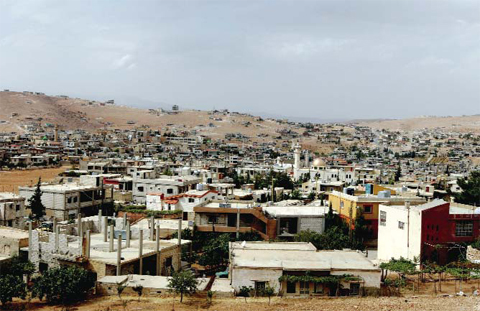 ARSAL: A general view of Arsal, a Sunni Muslim town eastern Lebanon near the Syrian border. A bomb exploded in the Lebanese town of Arsal yesterday, killing and wounding several people including clerics who were holding a meeting at the time, security officials and state media said. — AP
ARSAL: A general view of Arsal, a Sunni Muslim town eastern Lebanon near the Syrian border. A bomb exploded in the Lebanese town of Arsal yesterday, killing and wounding several people including clerics who were holding a meeting at the time, security officials and state media said. — AP
BEIRUT: A bomb exploded in a Lebanese town near the Syria border yesterday, killing and wounding several people including clerics who were holding a meeting at the time, security officials and state media said. The security officials said the bomb exploded in Arsal, near the office of the Qalamoun Clerics Association that is active in helping refugees. The officials, who spoke on condition of anonymity because they are not authorized to brief reporters, said 10 people were killed or wounded in the blast.
State-run National News Agency said the bomb was placed on a motorcycle that blew up outside the association's office, killing five and wounding six. NNA said the dead included the head of the group, Syrian cleric Osman Mansour.
Qalamoun is a mountainous region in Syria that borders Lebanon. Most of it was captured over the past year by Syrian troops and Lebanese Hezbollah fighters. Arsal is home to tens of thousands of Syrian refugees and the town was briefly captured last year by Islamic State fighters and al-Qaida's affiliate in Syria known as the Nusra Front.
During last year's raid the militants captured more than 20 Lebanese soldiers and policemen. The Qalamoun Scholars Association tried to mediate for the release of the Lebanese troops. Earlier yesterday, Amnesty International said the Syrian government's widespread and murky policies of disappearances have spawned a thriving market of bribery and exploitation.
Tens of thousands of people have vanished since 2011 and are believed to be in government detention. Families often don't know if their relatives are still alive or where they're held.
Families pay brokers up to tens of thousands of dollars for news of their disappeared relatives, sometimes receiving false information in return. The London-based rights group said bribes trickle down to officials and have become a steady source of income for the government. -AP

